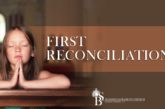The Seven Sacraments of the Catholic Church
I. Baptism

The sacrament of Baptism is the beginning of life—supernatural life.
When the sacrament of Baptism is administered, the spiritual vacuum which we call original sin disappears as
God becomes present in the soul, and the soul is caught up into that sharing of God’s
own life which we call sanctifying grace.
II. Reconciliation (Confession)

The sacrament of Reconciliation is a sacrament in which the priest, as the agent of God,
forgives sins committed after Baptism, when the sinner is heartily sorry
for them, sincerely confesses them,
and is willing to make satisfaction for them.
III. Eucharist (Communion)
 The catechism points out that the Holy Eucharist is both a sacrifice and a sacrament. As a sacrifice the Holy Eucharist is the Mass.
The catechism points out that the Holy Eucharist is both a sacrifice and a sacrament. As a sacrifice the Holy Eucharist is the Mass.
The Mass is that divine action in which Jesus, through the agency of the human priest, changes the bread and wine into
His own Body and Blood and continues through time the offering which
He made to God on Calvary—the offering of Himself for mankind. The act by which we receive the Holy Eucharist is called Holy Communion
IV. Confirmation
 While Confirmation is a distinct and complete sacrament in its own right, its purpose is to perfect in us that which was begun in Baptism. We might say—in a sense—that we are baptized in order to be confirmed. The Catechism’s section on Confirmation says that Confirmation is the special outpouring of the Holy Spirit. Its effects are to:
While Confirmation is a distinct and complete sacrament in its own right, its purpose is to perfect in us that which was begun in Baptism. We might say—in a sense—that we are baptized in order to be confirmed. The Catechism’s section on Confirmation says that Confirmation is the special outpouring of the Holy Spirit. Its effects are to:
- Root us more deeply in divine filiation (being children of God)
- Unites us more firmly to Christ
- Increases the gifts of the Holy Spirit in us
- Strengthens our bond with the Church
- Associates us more closely to her mission of bearing witness to Christ
- Helps us and more strictly obliges us to spread and defend the faith by word and deed
V. Marriage

To ensure the right use of the procreative power God founded the institution of marriage: the lifelong and irrevocable union of one man and one woman.
Up to the time of Christ, marriage, although a sacred union, was still only a civil contract between a man and a woman.
Jesus, however, took this contract, this exchange of marital consent between man and woman, and made the contract a conveyor of grace.
He made marriage a sacrament, the sacrament of Matrimony among Christians.
VI. Holy Orders
The sacrament of Holy Orders creates a priest. There are two notable ways in which the sacrament of Holy Orders differs from the other sacraments. One is the fact that Holy Orders can be administered only by a bishop. Only a bishop has the power to ordain priests. An ordinary priest cannot pass his power on to another. The second way in which Holy Orders differs from other sacraments is that Holy Orders is not received all at once.
VII. Anointing of the Sick (Extreme Unction)
The Anointing of the Sick is a remarkable sign of God’s great love for us. In his merciful efforts to bring us safely to himself in heaven, God seems to have gone to the very limit. The Catechism of the Catholic Church’s section on the Anointing of the Sick defines the purpose of the sacrament as “the conferral of a special grace on the Christian experiencing the difficulties inherent in the condition of grave illness or old age.” (Catechism, 1527)




